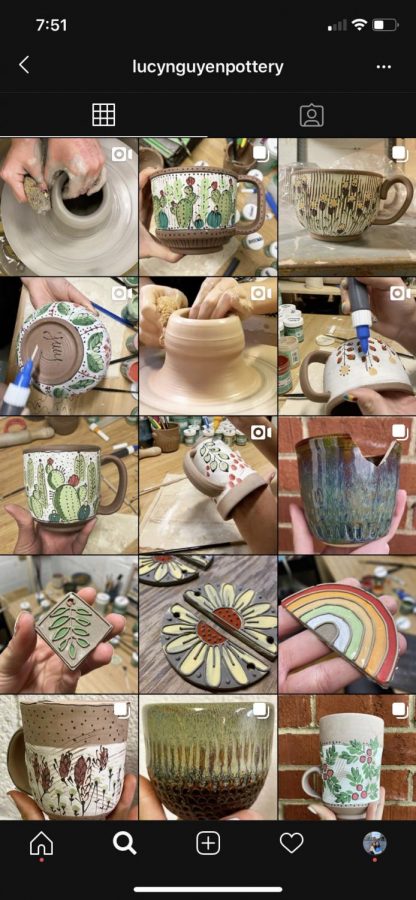Students who sell
Typically, hobbies are seen as separate from jobs–one is viewed as bringing joy and relaxation, while the other is a means to make ends meet. Some students have already found a way to integrate these two things.
Senior Sam Hollans runs six social media marketing accounts through Instagram. His biggest account, @hauntings, has almost 3 million followers. The page features a combination of memes and scary pictures, along with the ads he gets paid to post. Although Hollans now makes a profit from running these accounts, he did not originally do it because he thought it would make him money.
“I honestly just did it for fun, and then it ended up taking off over the course of six years,” Hollans said.
A study by Common Sense Media in 2018 found that 81 percent of teens used social media, with 70 percent of these teens checking their accounts multiple times a day. This prevalence puts extra pressure on influencers like Hollans to post often. Despite his business taking up approximately six hours of his day, Hollans finds the flexibility of being his own boss relieves some of the burden.
“It’s kind of hard, but since it’s all on my phone I can just like do it in between classes so it’s not like I have to be there for a set schedule,” Hollans said.
Junior Lucy Nguyen’s business was also initially a hobby. With her mother’s encouragement, she began taking pottery classes in fourth grade.
“I signed up for classes, and, honestly, I sucked so bad,” Nguyen said. “I was like the worst ever for three years, but I really, really, really wanted to get good at it. There were other older students in the class that could do it, and I was like if they can do it I could eventually do it, too.”
Sticking with it paid off, Nguyen now has a business selling her pottery, which she mostly works on at home. Although jobs are often a source of stress, Nguyen finds that hers is something she looks forward to.
“It’s a really nice mental relaxation for me because it’s something that I know I can do, and I don’t actually have to think about it while I’m doing it,” Nguyen said.
Managing a business can be a unique and rewarding experience, but Nguyen acknowledges that there are drawbacks to not developing the skills that accompany traditional high school jobs where students are employees.
“I’m not employed by somebody, so I think that’s an experience I’m missing out on,” Nguyen said. “But also I’m developing my management skills and my self-management skills.”
These skills are hard-earned as navigating a business comes with challenges — especially when it comes to being an influencer on social media.
-cut off
“I’ve lost a lot of money. I’ve been scammed a lot. I’ve lost a lot of [Instagram] pages from people hacking it or being disabled off Instagram,” Hollans said.
Instagram and other social media outlets have allowed for the rise of influencers like Hollans, who use their reputation with their followers to affect their purchasing decisions, though the social media companies are competing with them for advertisers and will purposely make it harder for influencers.
“A lot of the new updates are making it more difficult for influencers to profit off their app,” Hollans said. “With algorithms on where your posts get placed in the feed, sometimes will completely eliminate your followers from seeing your content. They have it make more sense for companies to advertise through the actual app and not within the users within the app.”
Though social media has its disadvantages, it allows students like Hollans and Nguyen to build and expand their businesses.
“I have my instagram account @lucynguyenpottery and a lot of people will message me through [Direct Messages],” Nguyen said. “My exposure has gained a lot this year. Last year at this time I had around 200 followers, and now I have 1,750.”
While some of her customers are Arlington parents and students, social media enables Nguyen to sell to people across the country.
“The large majority are complete strangers all over the U.S,” Nguyen said. “I’ve shipped multiple things to Texas, some stuff to Pennsylvania and North Carolina. One lady is waiting for me to finish something for her to send to Hawaii.”
Nguyen’s out-of-state customers pay her through Square Online, a digital store that helps businesses sell their products, or by sending her Amazon gift cards, though closer customers can pay in person with cash or check. All of Hollans’ business transactions are done online through Venmo. Both students use the money they make to invest in their future. Along with currently owning stocks and a retirement fund, Hollans’ business has already helped him with his more immediate future.
“It really helped me get into college actually, because I want to study business in college,” Hollans said. “My Common Application essay was mainly about my pages.”
Having a business can be financially beneficial to students, but Nguyen advises that satisfaction should be tied more to enjoyment rather than money.
“Do something you care about,” Nguyen said. “Don’t choose a product and try to make a business out of something that you don’t find passion in because you’re not going to like it. I only like running my business because it’s a side effect of doing my art and a way to maintain it and push myself forward.”











